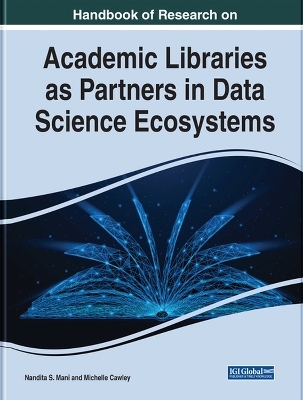
Academic Libraries as Partners in Data Science Ecosystems
Seiten
2022
Business Science Reference (Verlag)
978-1-7998-9702-6 (ISBN)
Business Science Reference (Verlag)
978-1-7998-9702-6 (ISBN)
Provides both a foundational base of knowledge around data science and explores numerous ways academics can reskill their staff, engage in the research enterprise, contribute to curriculum development, and help build a stronger ecosystem where libraries are part and parcel of data science.
While academic libraries have much to offer the data science (DS) landscape emerging at academic research institutions, they are often overlooked in terms of partnerships beyond providing space for data science activities. The editors conducted a broad environmental scan of over 60 institutions, collecting information from publicly available online sources to identify trends and establish familiarity with baseline services offered to support campus DS efforts. Although some academic libraries are collaborating in specific ways at a small subset of institutions, based on the environmental scan, it was clear how much untapped potential there is for developing partnerships. The authors also conducted a series of interviews with library counterparts at six exemplar institutions to gain insight in how these institutions are building connections between library staff and data science efforts across campus. As Library and Information Science roles continue to evolve to be more data-centric and interdisciplinary and research using a variety of data types continues to proliferate, it is imperative to further explore the dynamics between libraries and the data science ecosystems in which they are a part.
This book provides both a foundational base of knowledge around data science and explore numerous ways academicians can reskill their staff, engage in the research enterprise, contribute to curriculum development, and help build a stronger ecosystem where libraries are part and parcel of data science.
This book is a valuable resource for academic library institutions who are currently engaged or are formulating their strategy for engaging in data science. From Schools of Library & Information Science to library systems, this book will address how to reskill information professionals, integrate information science expertise in digital humanities, engage in curriculum design/integration, and will highlight international efforts in the evolving area of data science. Library and Information Science (LIS) schools can use this book as a text in helping students understand how the evolving area of data science intersects with LIS and how libraries which are central to the teaching and research mission of academic institutions, afford numerous opportunities for graduates and practitioners to research, work with, and partner on data science initiatives.
While academic libraries have much to offer the data science (DS) landscape emerging at academic research institutions, they are often overlooked in terms of partnerships beyond providing space for data science activities. The editors conducted a broad environmental scan of over 60 institutions, collecting information from publicly available online sources to identify trends and establish familiarity with baseline services offered to support campus DS efforts. Although some academic libraries are collaborating in specific ways at a small subset of institutions, based on the environmental scan, it was clear how much untapped potential there is for developing partnerships. The authors also conducted a series of interviews with library counterparts at six exemplar institutions to gain insight in how these institutions are building connections between library staff and data science efforts across campus. As Library and Information Science roles continue to evolve to be more data-centric and interdisciplinary and research using a variety of data types continues to proliferate, it is imperative to further explore the dynamics between libraries and the data science ecosystems in which they are a part.
This book provides both a foundational base of knowledge around data science and explore numerous ways academicians can reskill their staff, engage in the research enterprise, contribute to curriculum development, and help build a stronger ecosystem where libraries are part and parcel of data science.
This book is a valuable resource for academic library institutions who are currently engaged or are formulating their strategy for engaging in data science. From Schools of Library & Information Science to library systems, this book will address how to reskill information professionals, integrate information science expertise in digital humanities, engage in curriculum design/integration, and will highlight international efforts in the evolving area of data science. Library and Information Science (LIS) schools can use this book as a text in helping students understand how the evolving area of data science intersects with LIS and how libraries which are central to the teaching and research mission of academic institutions, afford numerous opportunities for graduates and practitioners to research, work with, and partner on data science initiatives.
Nandita S. Mani, University of North Carolina at Chapel Hill, USA Michelle A. Cawley, University of North Carolina at Chapel Hill, USA
| Erscheinungsdatum | 01.12.2021 |
|---|---|
| Sprache | englisch |
| Gewicht | 633 g |
| Themenwelt | Sozialwissenschaften ► Kommunikation / Medien ► Buchhandel / Bibliothekswesen |
| ISBN-10 | 1-7998-9702-8 / 1799897028 |
| ISBN-13 | 978-1-7998-9702-6 / 9781799897026 |
| Zustand | Neuware |
| Haben Sie eine Frage zum Produkt? |
Mehr entdecken
aus dem Bereich
aus dem Bereich
2. Wissenschaftliche Bibliotheken (AVWB) und Staatliche Bücherei- und …
Buch | Softcover (2024)
De Gruyter Saur (Verlag)
CHF 55,90


